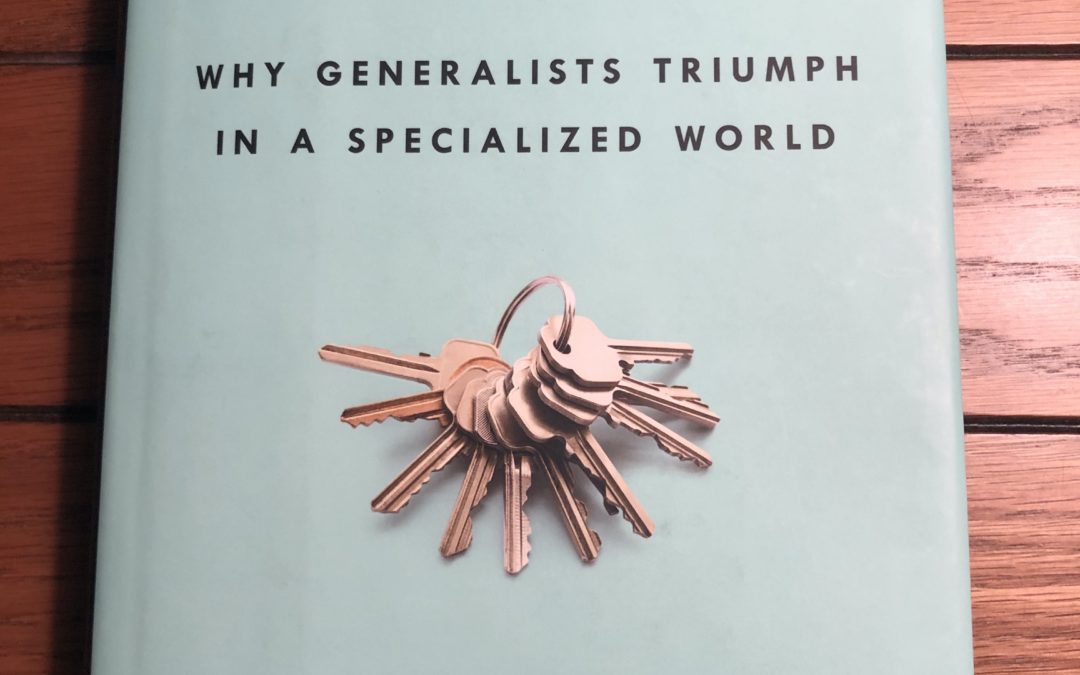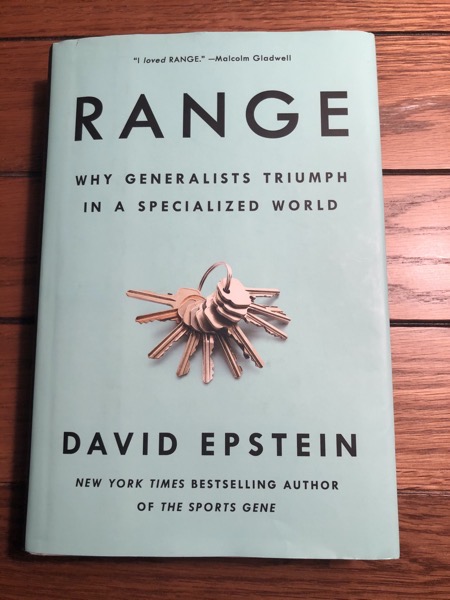
by Gary Mintchell | Oct 15, 2019 | Commentary, Education, Personal Development
This is a post about education, personal development, and why you should be a generalist.
Tiger Woods was trained almost from the cradle for one thing–to be the greatest golfer.
Roger Federer tried many sports. He loved soccer. Even though his mother was a tennis teacher, he didn’t pick up tennis until his early teens. Other kids had been playing for years by then. He soon passed them by and into his thirties is a dominant tennis star.
You need to be good at something, but it is good to be interested and experienced in many things.

I have a book to recommend. Range: Why Generalists Triumph in a Specialized World, by David Epstein. This book will help you learn to live a fuller life–and help you bring up your kids and encourage your grandkids.
Life in the industrial age, as well as in some previous eras, was composed of patterns. You could be trained to recognize patterns and adapt and become skilled at them. These are called “kind” learning environments. Kids excel who see and repeat the patterns.
Life today is what a psychologist call a “wicked” learning environment. Here, the rules of the game are often unclear or incomplete, there may or may not be repetitive patterns, and they may not be obvious, and feedback is often delayed, inaccurate or both. In most devilishly wicked learning environments, experience will reinforce the exact wrong lessons.
So, let’s look at responding to today’s “wicked” learning environment. “The bigger the picture, the more unique the potential human contribution. Our greatest strength is the exact opposite of narrow specialization. It is the ability to integrate broadly.” This all sounds great. But what about what I read in the news as the “typical Trump voter” who is a worker trained in the old way watching his job being replaced. And who is the leader who is poised to take them to this next level? Well, no one. Just leaders who play to their fears.
There are some courageous leaders changing the system for educating young people so that they can thrive in this new environment. We just have to have more of that. More people guiding young people—and older people, as well—need to take into practice this advice from psychologist and creativity researcher Dean Keith Simoton, “Rather than obsessively focusing on a narrow topic, creative achievers tend to have broad interests.” Modern work demands knowledge transfer—the ability to apply knowledge to new situations and different demands. In my life I have worked with both highly educated engineers AND high-school-educated technicians who exhibit this. More must be encouraged.
For those who, like me, studied broadly as an undergraduate and didn’t care much about grades, take this observation from professor and researcher James Flynn who was “bemused to find that the correlation between the test of broad conceptual thinking and GPA was about zero. Flynn, “The traits that earn good grades at [the university] do not include critical ability of any broad significance.
Here is a tip for those who teach at any level. When asking a student a question, force them to answer, even if it is wrong. Then just force them to answer again. And again. Until they get it right. Giving them hints to guide a correct answer quickly provided fewer long-term results than the first method. “Repetition is less important than struggle.”
Oh, and in a test of forecasting, experts were far worse than “amateurs” getting it right!
How does one adapt? By reading widely. Pursue several interests. That will be the human triumph in an age of robots.

by Gary Mintchell | Oct 31, 2018 | Education, Podcast
I have unleashed another podcast–180 Asking Why.
Asking why? Continuous learning. Helping educate our children. Ideas for solving new problems and developing new business.
Not in the podcast, but in the realm of learning, change agents, asking why, I have been reading Beth Comstock’s book, Imagine It Forward: Courage, Creativity, and the Power of Change reflecting on her experiences at GE and NBC. Must read for all of you who are change agents.

by Gary Mintchell | Apr 16, 2018 | Productivity
You know the stereotype of the creative genius who it spontaneous, keeps odd hours, disappears for a time. Let us blast that stereotype. This weekend I leave for Germany and another trip through the labyrinth of Hannover Messe. Typically at trade fairs, we are exposed to the fruits of a year’s labor developing new products. These will be touted with words such as creative, ground-breaking, unique, Few, in reality, will be that extreme. Many will be useful. Maybe a few will push a boundary. Maybe a couple will break new ground. I will be in search for the creative.
Curious about creativity, I read through Essentialism: The Disciplined Pursuit of Less by Greg McKeown Sunday morning. By the way, the pursuit of less (simplicity) is itself a fruitful discipline.
He quotes Charles Duhigg (The Power of Habit), “Routine…In fact the brain starts working less and less. The brain can almost shut down… And this is a real advantage, because it means you have all this mental activity you can devote to something else.”
Ah, routine. I glanced at the clock as I depressed the plunger on the French Press this morning. 5:51 am. That is plus or minus five minutes from every day as I prepare the morning’s coffee for Bev and me (except today it’s all mine–she’s traveling). Then I sit down with a light breakfast and gather my thoughts for a couple of posts.
Back to McKeown. He cites Mihaly Csikszentmihalyi in his classic Flow: The Psychology of Optimal Experience, said, “Most creative individuals find out early what their best rhythms are for sleeping, eating, and working, and abide by them even when it is tempting to do otherwise. They wear clothes that are comfortable, they interact only with people they find congenial, they do only things they think are important. Of course, such idiosyncrasies are not endearing to those they have to deal with… But personalizing patterns of action helps to free the mind from expectations that make demands on attention and allows intense concentration on matters that count.”
Maybe try:
- Get adequate sleep
- Rise, drink water, move a little
- Meditate, read something spiritually oriented, pray
- Light breakfast with some protein
- Exercise
- Get ready for the day
Go with the flow! Decide many things ahead of time so that more energy is available for real work–Deep Work as Cal Newport describes it.

by Gary Mintchell | Jul 17, 2017 | Automation, Commentary, News
Human-Machine Partnership. I love that phrase. It is in the title of the recent research report from the Institute for the Future and Dell Technologies. I wrote about the technology side of the report in my last post. This post will highlight the human and partnership sides of the report.
Takeaway: The way we work with technology in the near future will evolve into a partnership that can enhance human training and education building a workforce that is effective and focused on continual learning.
Challenge: The optimism in the report needs to be tempered by the question—will this only benefit the few self-motivated youth and those whose parents push them? How can we remake our institutional education (which is now global) such that we can provide mentors and a different way of motivating kids and young adults (as well as us old guys) into continual and self-paced learning?
From the report:
Recent conversations, reports, and articles about the intersection of emerging technologies and society have tended to promote one of two extreme perspectives about the future: the anxiety-driven issue of technological unemployment or the optimistic view of tech-enabled panaceas for all social and environmental ills. Perhaps a more useful conversation would focus on what the new relationship between technology and society could look like, and what needs to be considered to prepare accordingly. By framing the relationship between humans and machines as a partnership, we can begin to build capacity in machines to improve their understanding of humans, and in society and organizations, so that more of us are prepared to engage meaningfully with emerging technologies.
However, it would be a fallacy to assume that technology is making human effort redundant. It’s doubtful that computers will have fully mastered the fundamental, instinctive skills of intuition, judgment, and emotional intelligence that humans value by 2030. Over the next decade, partnering with machines will help humans transcend their limitations.
Human-machine partnerships will enable people to find and act on information without interference of emotions or external bias, while also exercising human judgment where appropriate. They’ll learn to team up with technologies integrated with machine learning tools to help activate and deactivate the resources they need to manage their daily lives. And they’ll partner with AR/VR technologies to develop necessary work skills, blending experiential media with human judgement to perform well at work.
Their ability to evaluate talent will also be bolstered by VR/AR technology, which will increase managers’ ability to evaluate a worker’s aptitude for gaining new knowledge or learning new skills and applying this knowledge to a new scenario.
By 2030, populations’ needs and resources will be orchestrated by self-learning, digital technologies, allowing humans to take the role of digital resource conductors. Technology will work as an extension of people, helping orchestrate, manage, and automate many day-to-day activities. And because the technology will be woven into everyone’s lives (some will even be implanted), and personalized to the individual, some needs will be met often before people even realize they have them. These digital technologies will be integrated with machine learning to create a population of digital orchestration systems, harnessing technology to arrange and direct resources to produce a desired result.
By 2030, many will be savvy digital orchestra conductors, relying on their suite of personal technologies, including voice-enabled connected devices, wearables, and implantables; to infer intent from their patterns and relationships, and activate and deactivate resources accordingly.
By 2030, expectations of work will reset and the landscape for organizations will be redrawn, as the process of finding work gets flipped on its head. As an extension of what is often referred to as the ‘gig economy’ today, organizations will begin to automate how they source work and teams, breaking up work into tasks, and seeking out the best talent for a task.
As the transfer of knowledge will be increasingly offloaded to emerging technologies, individuals will shoulder the burden of using these new technologies to acquire necessary skills to demonstrate proficiency. As a result, people will need to know how to access information and learn through immersive and experimental media such as AR and VR. (Big fear, can we restructure education so that we lessen the divide between digital haves and have nots? Or do we continue to stratify society?
INDIVIDUAL SKILLS & TRAITS
- Contextualized intelligence: nuanced understanding of culture, society, business, and people
- Entrepreneurial mindset: applying creativity, learning agility, and an enterprising attitude to find workarounds and circumvent constraints
- Personal brand cultivation: a searchable and favorable digital identity as basic work hygiene
- Automation literacy: the nimble ability to integrate lightweight automation tools into one’s own work and home life
- Computational sensemaking: ability to derive meaning from blended machine and human-based outputs
ORGANIZATIONAL SKILLS & TRAITS
- Business-driven security: embed security as a business strategy
- Eliminate latencies: exceed consumer expectations for real-time delivery
- Algorithmic branding: ensure algorithms align with organizational values
- Diversifying value of work: reset assumptions behind the value of work
- Inspire innovation: incent workers to deviate from machine-learned systems

by Gary Mintchell | Jun 8, 2017 | Productivity
It’s time to approach the personal productivity topic again. It has been too long. As you may know, I am a follower of Getting Things Done developed by David Allen and detailed in his book Getting Things Done: The Art of Stress Free Productivity.
I also use the Nozbe app to implement GTD. I know that if your tool is too awkward to use, you won’t use it. Works in automation, works in personal productivity. (affiliate link)
So you have your goals; you have your personal vision; you have projects; it boils down to next actions.
But beyond these things, what is really important these days?
I ran across this article on Medium by David Kadavy who is asking the deeper questions—what is really going to differentiate me from my peers and keep me active in the future. He postulates that even knowledge work is threatened by technology, so productivity needs to ramp up another notch or two.
He starts, “It’s not that GTD isn’t still a powerful tool for figuring out how to, well, get things done. It’s that the criteria for what should be done is more stringent than ever. Yes, books like The 4-Hour Work Week and Essentialism have helped us recognize the power of cutting through the noise to focus on the things that will bring us the most impact with the least effort. And it’s true that the ability to prioritize Deep Work will give you an edge over peers who are playing Candy Crush and checking their email every 5.45 minutes.”
“But there’s a realm beyond all of this. As jobs become automated, what remains of “work” will move up Maslow’s hierarchy. The success of the elite worker will depend upon that person’s ability not to get things done, but to have breakthroughs — to use access to knowledge and automation to deliver explosive ideas. To do that which only a human can do. Think Zero to One — the idea that incrementalism holds us back from paradigm-shifting innovation—but for your own career.”
He is on to something. This may not be new. I remember Peter Drucker from 30 years ago talking about doing the right thing rather than doing things right. And certainly creativity is something that sets humans apart from other mammals.
So, how do we get creative? It is more of a discipline of habitually doing things rather than praying for “bolts from the blue.”
- Try reading every day
- Read things from disciplines far outside the one you’re working in
- Every morning sit down with a notepad, write a question or problem, then list 20 ideas
- Practice asking questions—developing questions is more important than having answers
One last thought—as engineers and manufacturing leaders, what are we doing to make the world a better place? What are we doing to help people’s work better rather than simply trying to replace workers?








